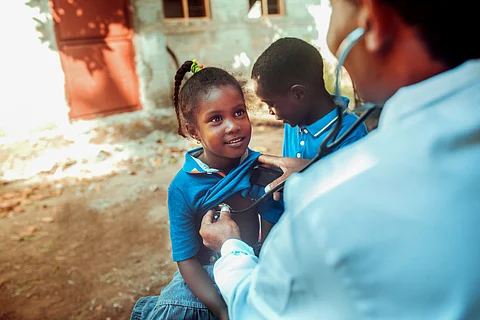

Taking lessons from the recent deadly disease outbreaks, the African Union (AU) through Africa Centres for Disease Control and Prevention (Africa CDC), has launched a new framework to address deeper structural public health deficiencies.
The framework, named as ‘New Public Health Order for Africa’ focuses on five key strategic pillars — strengthening public health institutions, strengthening public health workforce, manufacturing of vaccines, diagnostics and therapeutics and increasing domestic resources for health security as well as engaging in respectful and action-oriented partnerships.
Dr. Jean Kaseya, Director General of Africa CDC, has been wasting no opportunity to explain this new initiative, describing it as a shared path towards self-reliance for the continent.
“Existing global mechanisms, policies and interventions have consistently failed in addressing Africa’s health security priorities, as recently highlighted by the COVID-19 pandemic, Mpox, and Ebola,” he recently told a group of Members of Parliament (MPs) drawn from across Africa during a meeting in South Africa.
“There is a need for a fundamental paradigm shift toward an equitable and just public health landscape through the New Public Health Order for the continent. The continent must take control of its health security through strong local leadership, innovation and investment in public health infrastructure and systems,” he added, expressing optimism towards the new framework that has been in the works for the last three years and is now being rolled out.
The AU and Africa CDC are calling upon governments, multilateral organisations, philanthropies, the private sector and civil society organisations to support the full implementation of the framework to drive global health security.
“The New Public Health Order envisages strengthened National Public Health and Research Institutes, working with local universities, providing expertise in Emergency Operating Centres (EOCs) and genomic sequencing capabilities. It is geared to develop and expand local manufacturing that will see vaccines, diagnostics, therapeutics, and medical supplies all manufactured from the continent. There is a need for respectful action-oriented partnerships that will ensure long-term engagement, alignment on priorities by African countries with Member States in the driver’s seat,” reads in part a communique from Africa CDC.
Africa has responded to multiple public health-related emergencies with moderate success, but a host of lessons have been learnt. The COVID-19 pandemic, in particular, offered numerous insights and underscored the importance of regional coordination in addressing health crises.
Many initiatives emerged in response to the pandemic, marking critical milestones in Africa’s health security infrastructure.
The Africa Joint Continental Strategy for COVID-19 provided a comprehensive approach to containing the virus, while initiatives like the African Vaccine Acquisition Task Team (AVATT) and the Africa Medical Supplies Platform (AMSP) demonstrated Africa’s capability to mobilise resources in real time. The Africa Pathogen Genomics Initiative and the Partnership to Accelerate COVID-19 Testing (PACT) were instrumental in enhancing diagnostic capabilities and genomic surveillance, essential for understanding virus mutations and managing the spread of COVID-19.
“Most member states still rely on indicator-based surveillance systems with limited implementation of event-based or advanced processes. The over 160 disease outbreaks reported annually have revealed gaps in Member States’ abilities to prepare for and respond to emergencies,” said Dr. Kaseya, adding that only 5 percent of laboratories are equipped to diagnose priority diseases in their countries and meet international standards. “Africa relies heavily on imports; only 1% of vaccines and 30-40 per cent of therapeutics are manufactured on the continent,” Dr. Kaseya said.
Over the past two years, countries such as Egypt, Kenya, Morocco, Senegal, South Africa, Uganda, and Rwanda have taken significant steps to establish domestic vaccine manufacturing capabilities. These efforts represent a paradigm shift in Africa's vaccine landscape, as the continent aims to ensure more equitable access to vaccines and medical supplies during future health crises.
The lessons learned from COVID-19, Ebola and Mpox have shown that while Africa has made progress in public health preparedness, addressing the continent’s long-standing structural gaps will require sustained efforts, investments, and partnerships.
The initiative could be well-meaning, but faces a couple of challenges, in addition to the lack of political goodwill from top politicians and enforcement mechanisms for non-compliant state members, according to experts. For a continental entity that heavily relies on external donors for financial support or doesn’t fully roll out some of its key initiatives due to financial constraints, full implementation might be problematic.
Inadequate funding from member states limits the AU’s capacity to sustain long-term programs, making it difficult to implement ambitious projects effectively, even as Africa CDC asks member states to adhere to the Abuja Declaration of 2001, which says “African countries should allocate 15 per cent of their budgets to health”.
Yet, many hurdles are likely to be winding protocol which results in slow and uncoordinated decision-making. Multiple governance experts have also expressed concern that uniform implementation across member states with diverse political and economic circumstances may be problematic. Some countries may prioritise national agendas over continental goals, making cooperation inconsistent.
Lastly, many AU member states lack the institutional and technical capacity to implement continental initiatives effectively. Weak public institutions, insufficient expertise, and lack of infrastructure hinder the ability of countries to adopt and adapt to such AU programmes and directives.